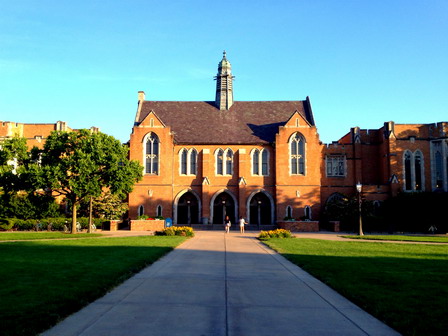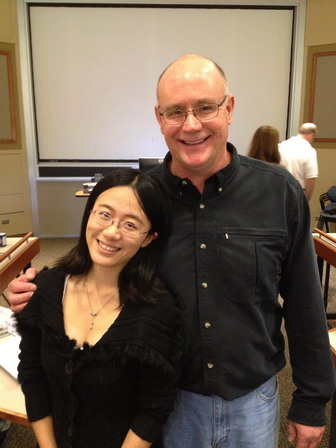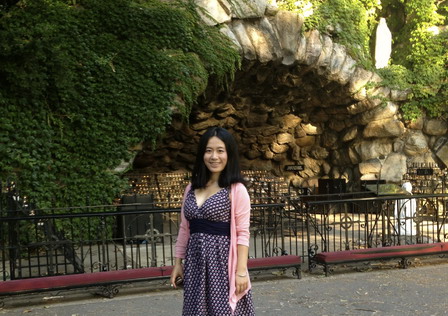2014-03-22 12:00
Perhaps we can change only a few people and perhaps most people around us will not be changed by us. Nevertheless, there are a few people who we can change. We can also decide what kind of people we will become and what we can bring to people around us.
What we believe shapes us.
And what kind of people we are also influences people around us.

I feel very lucky to have received financial support from YouChange and become one of the first group of “One Hundred” Plan—a project to cultivate 100 young leaders on philanthropy in China—to pursue Master of Nonprofits Administration (MNA) in Mendoza College of Business of University of Notre Dame this summer.
One month, five courses and 12 credits—this is my summer curriculum. I attended classes for eight hours and spent five hours in homework and pre-class reading every weekday; and joined crazy parties at weekends. This is the fast pace in America. As a top business school in the US, Mendoza College of Business provides first-rate faculty and most professional services for this MNA program. In this best MNA program in America, my classmates included leaders from well-known charity organizations such as Volunteer of America, Peace Corps and American Cancer Society. (They were also my craziest playmates and I concede that I liked them more when they got drunk in parties.)
I have to say in that one month I received the best education I have had in many years. And there are so many things to say about it. I will start with Bob, the most respected teacher for the whole class.
Bob is our teacher on human resources course. Although I am not sure about all his beliefs, I know he is a strong believer that people should respect each other. That’s why he takes every question from students seriously. Once I could not understand his answer, he explained it in another way. He talked slowly and kept asking me “Does it make sense?” until I fully understood. He believes greatest understanding should be given to students. That’s why he once dismissed class half an hour ahead of schedule so that we had time to prepare for presentation in the following course. When I was too tired and bent over the desk in the classroom, he asked my friend to make sure that I was well. He believed in the calming effect of music, so he played music in the classroom and emailed all of them to us at the end of the course. He believes that grade is not equal to capacity and achievement, so he didn’t care the college’s requirement that student grades follow normal distribution and gave A-grade to as many students as he could.
That’s why in the last class he received a gift card full of our best wishes, listened to the music we presented and took photos with us at our request. Among all five teachers, only Bob enjoyed this. He had our highest tribute and respect.

Bob once asked us to write three beliefs papers to describe our beliefs forged in childhood, adolescence and adulthood. These must be important beliefs that have profound influence on our conception, behavior and relationship. In these papers, we must explain what were our beliefs, how were they forged, how they influenced me, what evidence could be found to prove or discredit these beliefs, under what circumstances did they change and why they changed?
At the beginning, I thought this homework was too easy and nothing special. But when I started to review my past experience, to prove our beliefs and to what extent my actions were influenced by my beliefs, I was overwhelmed by a huge empathy with my past self. In particular, when I wrote my adolescent beliefs, I had to stop for several times with tears welled up in my eyes.
Bob hoped, this homework would help us strengthen self-awareness in dialogue with ourselves and know our beliefs better and see more possibilities in dialogue with the outside world. (What evidence can prove or discredit this belief?)
My three beliefs are as follows:
1)Love and goodness can make a difference;
2)Everyone is alone;
3)There is no absolute justice in the world.
American teachers are very committed. All our assignments were reviewed carefully by professors. They would correct even the tiniest grammar mistakes on the homework of international students like us. Bob replied my homework with a 1,000-plus-word email in which he not only reviewed my belief papers, but also shared with me his beliefs. (There were 35 students in my class and I truly admired my teachers’ commitment. I think it is because they are strong believers in mutual respect. Students spent so much time in their papers and teachers should spend no less time in review them.)
In his reply to my first paper, Bob said,
"Can you imagine what your later beliefs would look like if you had started life with the belief that goodness and love didn’t matter? Pretty scary, isn’t it? "
My second paper was about my pursuit of the question “Who I am”. Bob shared with me how he searched his faith and how he addressed his faith dilemma. He also shared with me his two favorite quotes:
"I don't know who my grandfather was; I am much more concerned to know who his grandson will be. (Abraham Lincoln)"
You've got to do your own growing - no matter how tall your grandfather was. (Irish Proverb)
In his reply to my third paper, Bob cited obesity in the US as an example to share with me his opinions on justice and distribution.

I was very much touched that night when I received his email and read his sharing. Again, Bob proved what he strongly believed in with his deeds. He acts exactly what he believes! He proved his argument again that What we believe shapes us.
Notre Dame is a Catholic university and I think that’s why it is not so famous in China. In the past, I would also have had some suspicions about its Catholic background. But now, I believe its Catholic background is one of the major reasons for Notre Dame to be such a distinguished university. It has many teachers like Bob whose faith encourages them to be nice to people and dedicate themselves to do right things. Their teaching and service has influenced students year by year. They have set such a good personal example that students, after soul-searching, will follow suit.
This is an environment I hardly enjoyed in my college years. After return to China, I kept considering how large the gap is between China and the United States. Although America has its own problems, I appreciate the following I found in America:
I feel equal respect, benevolent love and mutual support and assistance.
Now, I firmly believe,What we believe shapes us.
Thirties years of rapid growth has made China the second largest economy in the world. But we come to realize that we have lost some of our tradition and become cynical. We need to ask the following questions to ourselves:
Maybe I am a little bit too idealistic and maybe some people around us do care only about many properties they have. But it is up to ourselves who know what kind of life we are leading, who should be accountable to our life, and who feel and judge whether our life has value or not.
Perhaps we can change only a few people and perhaps most people around us will not be changed by us. Nevertheless, there are a few people who we can change. We can also decide what kind of people we will become and what we can bring to people around us.
What we believe shapes us.
And what kind of people we are also influences people around us.
I remember one of my childhood friends once said his dream was to be a good person. I think this has also become part of my dream. If we have basic mutual respect and more trust and love with each other, this represents a good start of our efforts to realize the Chinese dream.
Editor’s note: this is an email (abridged) from Sarah Yue Liu, a trainee of “One Hundred” Plan.
“One Hundred” Plan: YouChange initiates the “One Hundred” Plan with China Foundation Center and Non-profit Organization Research Center of the Renmin University of China (RUC). With the dual master degrees program in non-profit management provided by RUC and University of Notre Dame, the plan is to select 100 professionals from the third sector. The aim is to cultivate future China philanthropy leaders with solid professional skills and hands-on experiences from both Chinese and western cultures.
Home page|Sit map|Link|Contact us|Copyright statement
Youcheng entrepreneur foundation for poverty alleviation,privacy of copyright and all rights reserced
Technical support:益云
